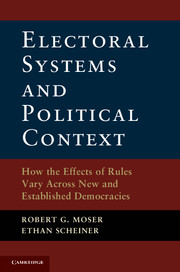 Electoral Systems and Political Context
Electoral Systems and Political Context Why and How Political Context Matters for Electoral System Effects
Published online by Cambridge University Press: 05 November 2012
In this book, we argue that electoral systems often do not lead to the outcomes that scholars commonly attribute to them because the effects of electoral rules are conditioned by the context in which they operate. We do not suggest that most existing theories about the effects of electoral rules are wrong across all contexts. We also do not claim that we are the first to acknowledge and highlight the impact that political context can have on electoral system effects. However, we do argue that the electoral system literature has tended to emphasize the ability of electoral systems to shape electoral outcomes irrespective of context. Thus, our central point is that many important ideas about the effects of electoral systems are founded on the assumption of particular contextual foundations, and that the effects of electoral rules differ in a predictable and systematic way when the rules operate in a different context.
CONTEXT CONDITIONS INSTITUTIONAL EFFECTS
In the broadest sense, this book offers a different emphasis regarding the interpretation of how institutions and context interact to influence outcomes. In much of the scholarship on institutions, especially work in the rational-choice institutionalist vein, formal rules are expected to impinge on the environments in which they are embedded. The expectation is that institutions channel behavior in consistent ways, and therefore produce relatively uniform outcomes. Much of the distinction between the effects of different electoral rules made by the literature is due to the expectation of a conditioning effect of “restrictive” rules (e.g., FPTP). FPTP is expected to deny representation to parties and candidates who win only a small share of the vote, and therefore leads to outcomes that are different from what we see under “permissive” rules (e.g., PR with high district magnitude and low legal thresholds of representation), which provide representation even to contestants who win relatively few votes. For example, the most common argument regarding the interaction between context, in the form of social diversity, and electoral systems is that greater social diversity promotes the proliferation of political parties except in the presence of (restrictive) single-member district, first-past-the-post electoral rules. Most scholarship argues that FPTP rules place a brake on the effect that social diversity has on party system fractionalization because of the incentives that the rules create for voters to defect from small parties to larger, more competitive alternatives. As a result, irrespective of social diversity, FPTP rules ought to cap the number of viable competitors at two per district.
To save this book to your Kindle, first ensure no-reply@cambridge.org is added to your Approved Personal Document E-mail List under your Personal Document Settings on the Manage Your Content and Devices page of your Amazon account. Then enter the ‘name’ part of your Kindle email address below. Find out more about saving to your Kindle.
Note you can select to save to either the @free.kindle.com or @kindle.com variations. ‘@free.kindle.com’ emails are free but can only be saved to your device when it is connected to wi-fi. ‘@kindle.com’ emails can be delivered even when you are not connected to wi-fi, but note that service fees apply.
Find out more about the Kindle Personal Document Service.
To save content items to your account, please confirm that you agree to abide by our usage policies. If this is the first time you use this feature, you will be asked to authorise Cambridge Core to connect with your account. Find out more about saving content to Dropbox.
To save content items to your account, please confirm that you agree to abide by our usage policies. If this is the first time you use this feature, you will be asked to authorise Cambridge Core to connect with your account. Find out more about saving content to Google Drive.